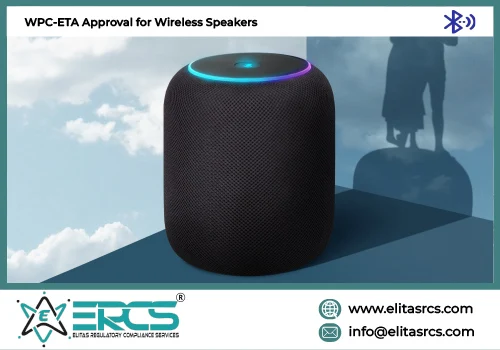WPC Approval (ETA) for
Wireless Speakers in India

Wireless Speakers
Speakers that do not need a wired connection to a source device are referred to as wireless speakers. These speakers are able to play music and other forms of audio material without requiring a connection to the source device. They connect to the source device and stream audio material by using Bluetooth, Wi-Fi, or other wireless technologies such as those mentioned above. They are available in a wide range of sizes, forms, and designs, and they come equipped with capabilities like as voice assistants, water resistance, and the ability to link many rooms. Because of their mobility and versatility, wireless speakers have become a popular option for use in a variety of settings, including home theatres and activities that take place outside. On the other hand, they might have a number of negatives, including a worse sound quality and the possibility of connection troubles in the event that the signal is either weak or disturbed.
The Wireless Power Consortium (WPC) approval is a certification that is granted to wireless charging devices to certify that they are compliant with the Qi wireless charging standard. Another name for this certification is the Wireless Power Consortium approval. This certification is necessary for wireless speakers and any other products that use the technique of wireless charging. Wireless speakers that have received WPC certification have been put through rigors testing and verification to ensure that they fulfil all of the required requirements for effective and safe wireless charging. It is essential to seek for the WPC certification logo when shopping for wireless speakers. This will guarantee that the product is compatible with other Qi-certified products and that it can be charged in a secure and effective manner. WPC accreditation is essential for wireless speakers because it verifies that the product is compatible with other wireless charging devices and assures that it complies with industry standards for safety and dependability.
Basic Requirement to get WPC (ETA) approval
Following requirement should be fulfilled by applicant –
Foreign Manufacturers –
Foreign Manufacturer (Applicant) has to appoint Authorized Indian Representative (AIR).
If Foreign Manufacture (applicant) has the Branch office/Liaison office in India then, they can become an AIR.
Domestic Manufacturer –
The domestic (Indian) Manufacturer can directly apply for ETA and import license without nomination of AIR.
Required Documents
For ETA Certificate –
- Copy of Company Registration /GST registration (For address Verification)
- ID and address proof of authorized person
- Radio Frequency (RF) Test report from any foreign laboratory that is ISO 17025 certified or an Indian laboratory that is NABL approved
- Authorization letter (If authorized person is other than CEO)
- Product technical details
For Import License –
- ETA Certificate
- Purchase order
- IEC Certificate
- Proforma Invoice
What is RF (Radio frequency) test report and how to get it?
RF (Radio Frequency) testing is a method of checking the frequency of radio transmissions to ensure that they are efficiently using the spectrum. In order to achieve maximum efficiency, it is essential to ensure that radio waves in the airspace do not conflict with one another.
Manufacturers/ Importer need to get the RF test report from the ILAC/NABL accredited lab for ETA approval to sell the product in India. If the multiple RF modules contains in the particular product, then the test report of all modules to uploaded to get ETA approval.
Process to get Equipment type approval (ETA) from WPC department:
- Checking EN standard and RF testing from AuthorizedLaboratory
- Documents Preparation
- Application Filing to WPC (Online portal generation)
- Submitting the requisite fee online to Govt.
- Application Scrutinization by WPC
- Grant of ETA Certificate by WPC